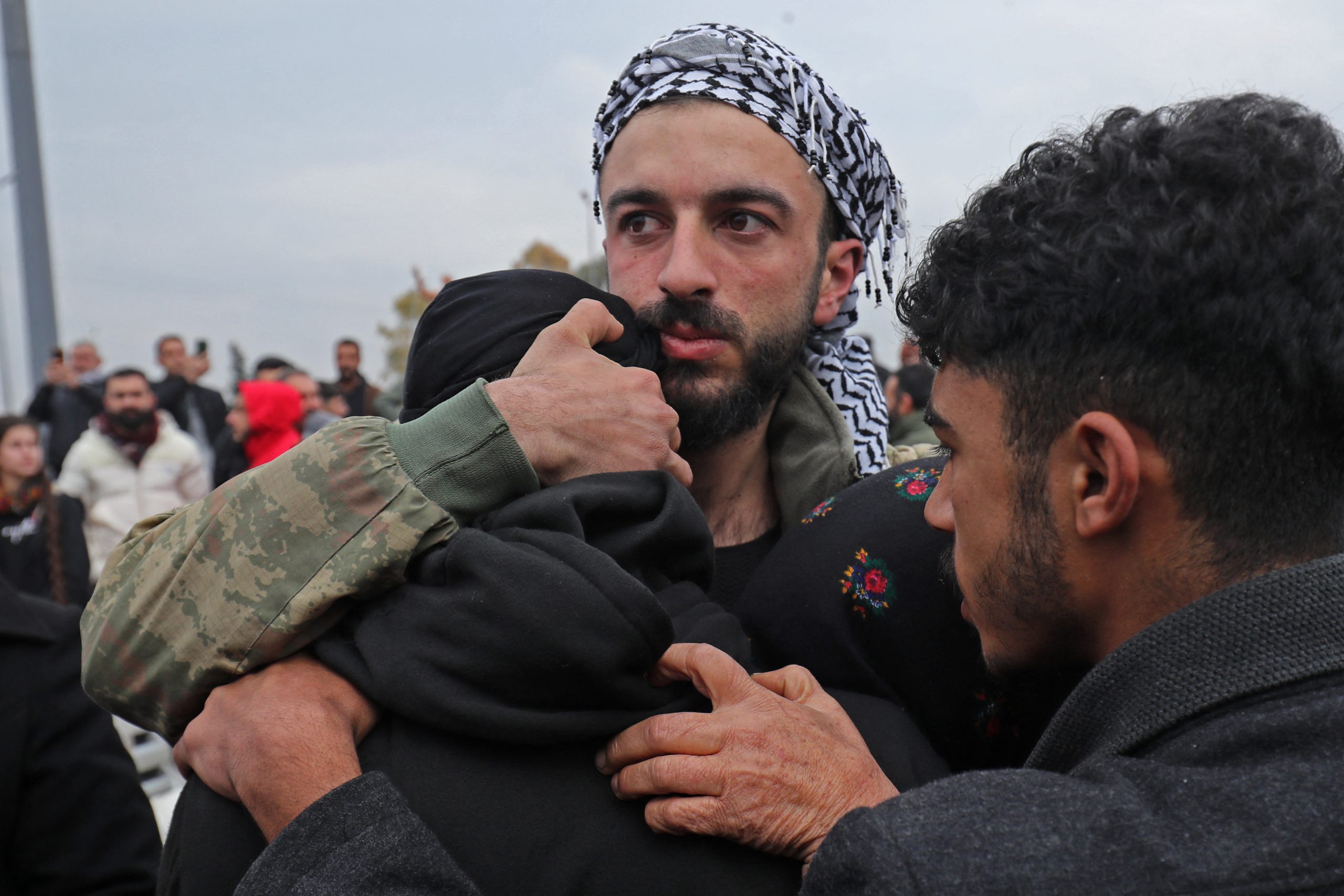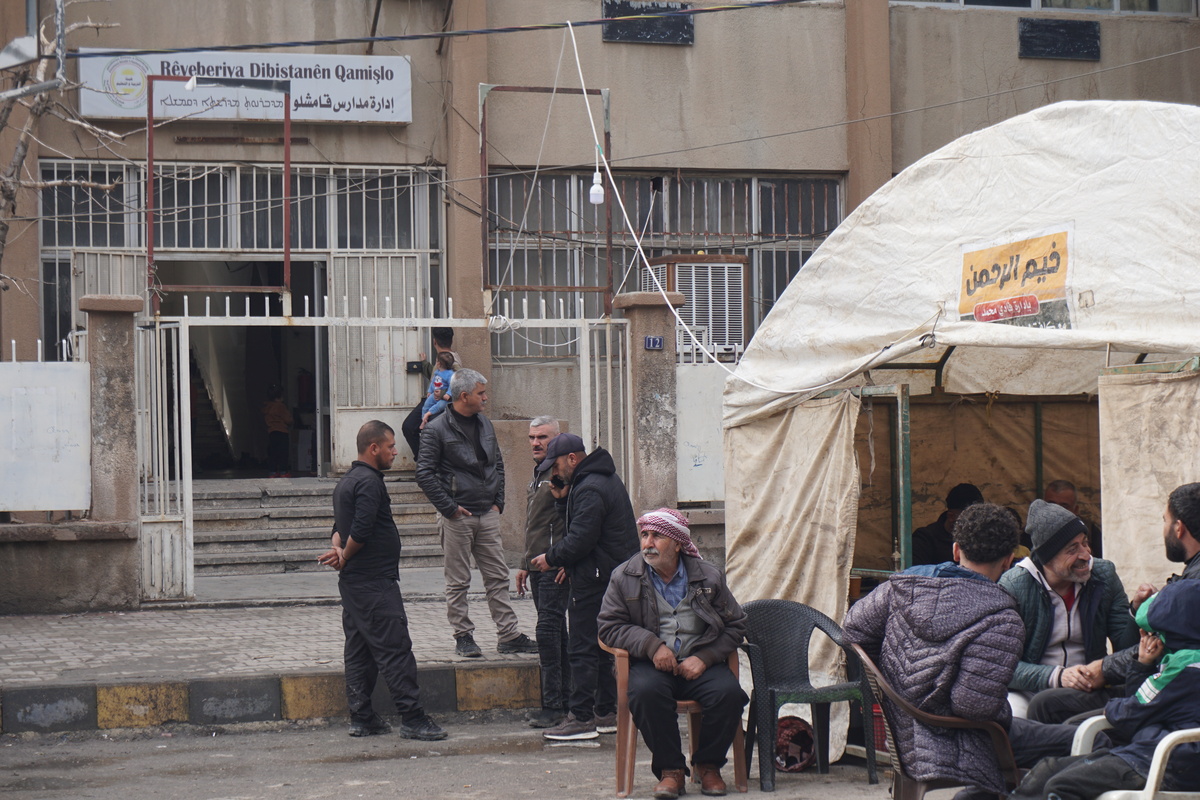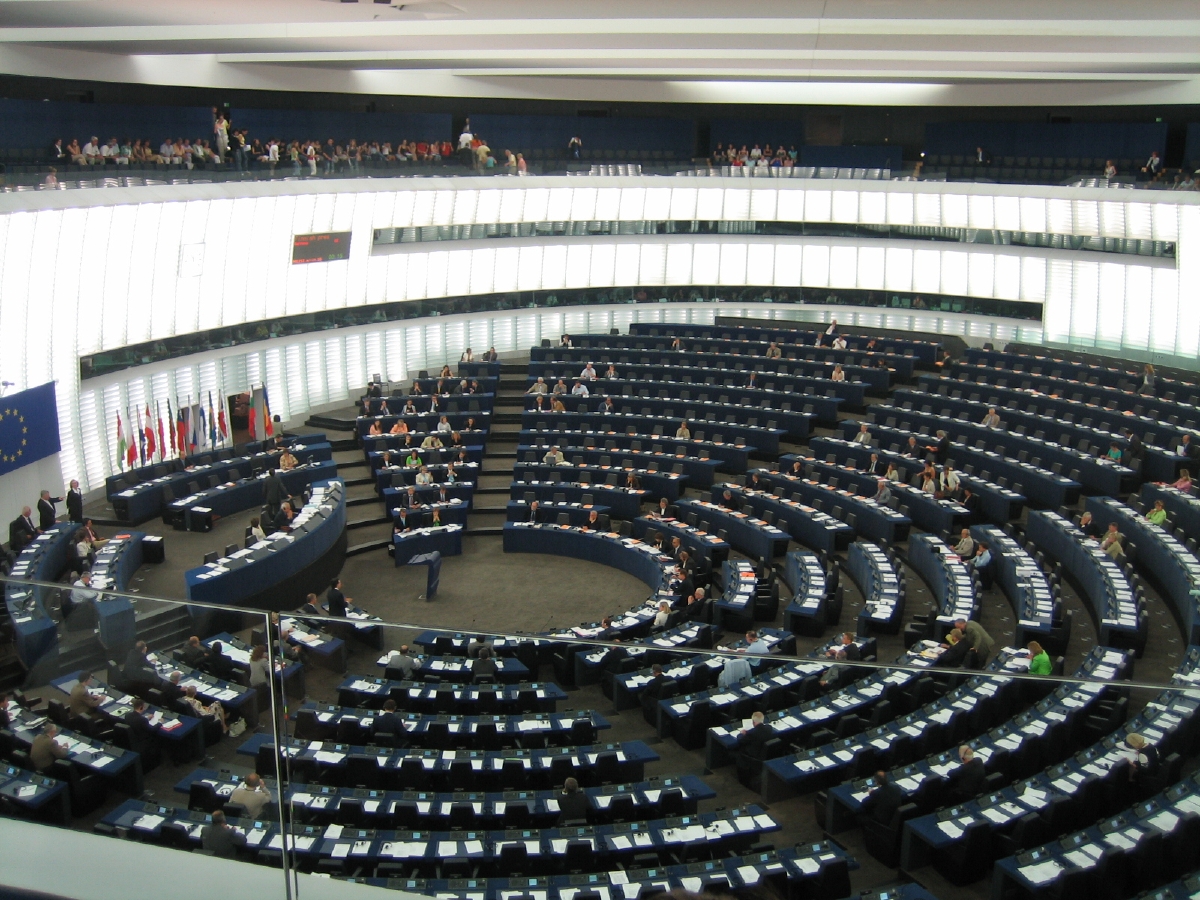In Syria’s Olive Heartland, Farmers Fear the Harvest
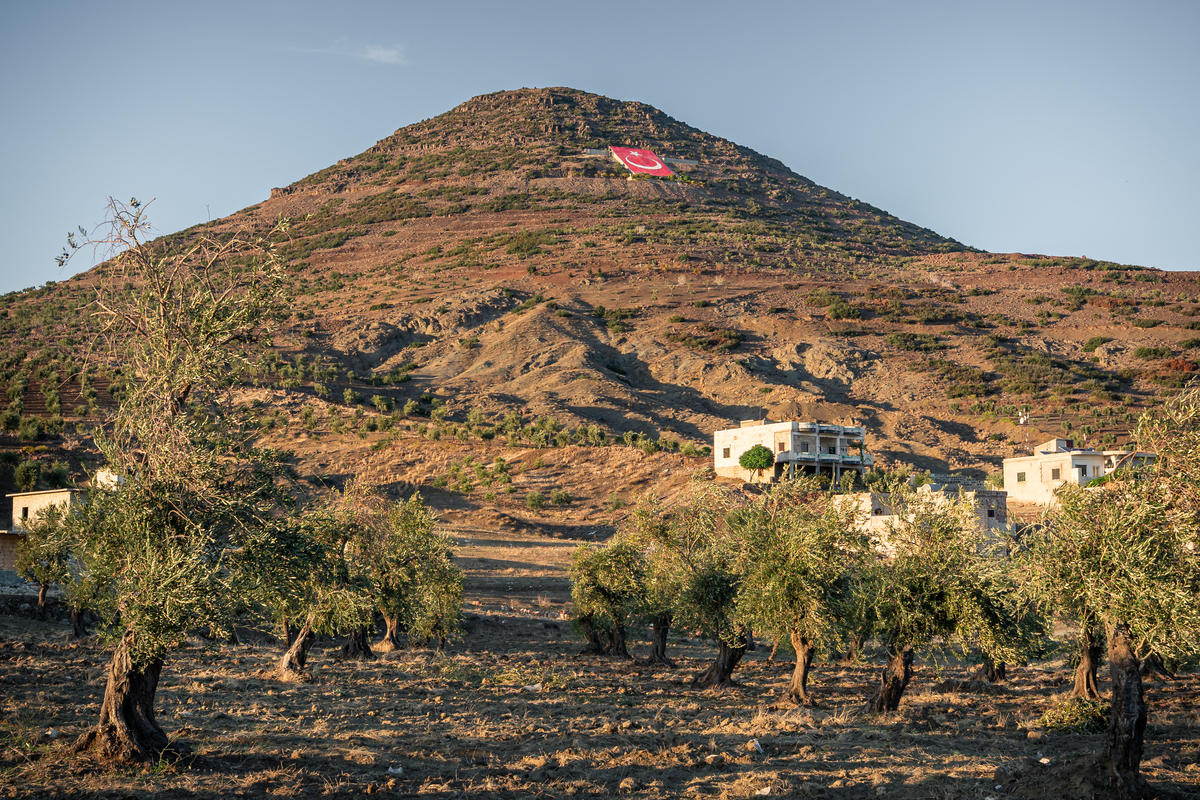
SYRIA, Afrin District, October 25, 2025.
Report on the olive harvest season in the Afrin district, where, despite the disbanding of SNA factions and their integration in the new Syrian army, remnants of the factions continue to pose a threat to Kurdish farmers. Since 2018, and the irruption of SNA Turkish-backed factions in the Afrin district, olive trees and their harvest have been at the center of a predation system organized by different factions, this at the expense of local farmers, a vast majority of them being Kurds.
Above the city of Bulbul, located not far from the Turkish border, and where many factions have installed military bases, a Turkish flag has been added on the hill. Despite having, in theory, been returned to the authority of the Syrian state, the region remains under heavy faction control | Picture Credits: Charles Cuau
Picture Credits: Charles Cuau
Late October in Afrin, the Sharran olive press is a hive of activity. Under the watch of the press director, Hassan Jamal Kharbash, tractors file into the courtyard and unload sacks of freshly picked olives, the presses roar, and the fresh scent of crushed fruits fills the air.
The scene is almost cheerful, but behind the laughter and chatter, the farmers hide a deep anxiety.
Afrin is the country’s second largest olive oil-producing region, with approximately 15 million olive trees
One farmer, who asks not to be named, climbs down from his tractor and explains that he paid $100 to a man from a local militia faction – he came to his house with a gun to extort him. “We don’t have a real state here yet,” he says quietly.
Harvest season began ten days ago in this predominantly Kurdish part of northwestern Syria. Afrin is the country’s second-largest olive oil-producing region, with approximately 15 million olive trees. In the fields, wooden ladders lean against heavy branches, large tarps spread beneath the trees to catch the fruit, and olives are hauled to presses scattered across the region.
From the back of the courtyard, another farmer, a woman, who is there to drop off her olives, shouts: “Don’t give them your name, it’s dangerous.” She says that she does not fear the militias, but still prefers to speak anonymously. This year, the woman had hoped for a calmer harvest season, especially with the return of the Interim Government’s authority to the area. She has had to hand over fifty sacks of olives, each weighing eighty kilos, to have access to her groves – a loss she estimates at $4,000.

An Arab worker, engaged by a Kurdish olive grove owner, harvesting olives near the village of Metina. Picture Credits: Charles Cuau
Another man at the press says he hasn’t seen his land in six years, “A faction harvests it now and keeps the profits,” he laments.
The Militia’s Grip
Not for the first time, the harvest unfolds under the militias’ shadow: the Syrian National Army (SNA), a coalition of factions armed and financed by Turkey since 2017. Its members have ruled Afrin with an iron fist, and their reign has involved extortion, kidnappings, home seizures, and systematic theft, according to human rights groups and residents.
After Ahmed al-Sharaa rose to power and took Damascus, the group was dissolved and officially joined the Syrian army in early 2025. However, many fighters never left the area. Some have joined the Interim Government’s General Security forces; others simply ignored orders to disband. It is these former-SNA members that farmers now accuse of attacking their farms.
The council takes half of the harvest from exiled owners who have local representatives on the ground. And if no representative is present, the entire yield is confiscated.
Since Damascus reasserted control, a new local body, the Economic Council, has been created to manage property and farmland. Officially, it handles the restitution of assets to displaced Kurdish owners. But in practice, “they’ve institutionalized the racket,” says Azad Osman, a member of the local council and the Association of Independent Syrian Kurds.
The council, he explains, takes half of the harvest from exiled owners who have local representatives on the ground. And if no representative is present, the entire yield is confiscated. Authorities justify this as a management fee for maintaining the land, but Osman sees it differently: “We’re colonized again,” he says, “only this time by the state.” He does, however, nuance this by pointing out that the council has nevertheless allowed the restitution of several plots of land, houses, and shops since he took office.
But now the Interim Government requires property certificates – documents that were rare before the war and only became widespread under SNA rule – documents that many farmers do not have.
Policing the Chaos
At a café outside the Sharran press, two policemen are sitting at a table, eager to share their views. Both are from Idlib and have worked in the region for eight years. “The problem was the SNA and its soldiers,” they explain, distancing themselves from the militias. They claim there are no longer problems with former faction members and attribute most thefts to desperate refugees.
Yet even they admit that they fear the militias, especially Mohammad al-Jassem, better known by his alias Abu Amsha, the notorious commander of the Sultan Suleiman Shah Brigade, who ran an extortion network and is sanctioned by both the U.S. and EU for human rights abuses. He remains one of the few faction leaders with his own base in the area.
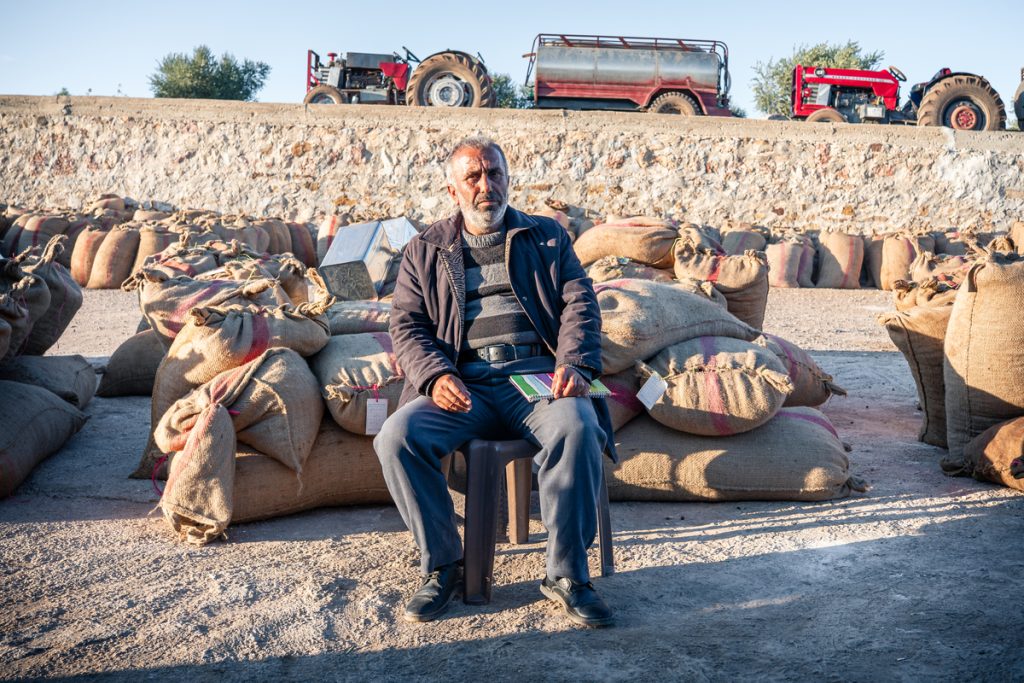
Courtyard of the Ceqmaqe Bicuk oil press, located between Rajo and Bulbul, where many violations against Kurdish farmers continue to be recorded this year. In front of jute bags containing olives that were harvested, Mohammad Hamid, a farmer who suffered from factions many times. His car and tractors were stolen, he was hit. He filed 14 complaints in the Afrin courtroom but without any success or reparations. Picture Credits: Charles Cuau
Sheikh Saeed Zado, a newly elected regional deputy, says the situation will improve. He argues that thefts and threats now come only from isolated soldiers, left behind after their commanders’ departure; he insists the militiamen will leave once the harvest season ends.
Azad Osman is less optimistic. He believes the relative calm owes more to the drought, which has greatly reduced yields, than anything else. To Azad’s point, the regions of Rajo, Sharran, and Bulbul have been hit particularly hard by thefts, precisely the areas with better rainfall and, thus, better harvests.
“Since the Fall, It’s Been Chaos”
In Ceqmaqê Biçûk, a village near the Turkish border, farmer Muhammad Hamid recounts his ordeal: in 2018, militiamen came to his home, beat him, and tore out his toenails. Since then, he has filed fourteen complaints. None has led to action: “I’ve complained to everyone except God,” he says. This year, his tractor, motorcycle, and car were stolen. He was able to get the latter back.
At the local olive press, everyone has a story about the militias. “Since the fall it’s been chaos,” director Riad Muhammed says. “Some farmers have lost half their harvest. They have weapons, and we have no means to defend ourselves.”
He points to a few sacks strewn by the side of the facility. They were dropped off a few days ago by men from the Failak al-Sham faction – they had come to have their olives pressed. “I’ll have to press them and give the oil back to the men who rob and threaten us,” the director shrugs. “We have no choice.”
The Road to Turkey
…the olive oil reportedly travels north into Turkey, is re-labeled as Turkish, and exported to international markets, sometimes even ending up on European shelves
Once stolen, the olives must still be processed and sold. According to Azad Osman, most of the militiamen do their business in Azaz, “That city wasn’t originally an olive center, since there are few groves nearby.” In his view, the city’s new role proves that the stolen olives are being taken there.
From there, the olive oil reportedly travels north into Turkey, is relabeled as Turkish, and exported to international markets, sometimes even ending up on European shelves.
Though the Turkish military police have left the area, the Turkish army remains very much present. Numerous bases in the region still fly the red flag with the white crescent. Pointing to a base overlooking the village, Hassan Jamal Kharbash, the Sharran press director, says, “The Turks act in the shadows. They do nothing visible, but if they weren’t here, there would be no factions.”
However, not all stories are of loss and fear. In Dayr Şawwān, a family recently returned from Tel Rifaat camp prepares pickled olives on their terrace, overlooking the Turkish border. Their home, once adjacent to a Sultan Shah Murad militia base, is now quiet.
For this family, the harvest season signifies a fragile return to normalcy. In the area, most militia bases have been abandoned, and former symbols of armed factions have been painted over. Local governance has begun to reclaim authority over land and property. Perhaps a symbol of the region’s first steps toward emancipation.
Pauline Vacher
Pauline is a freelance journalist currently based in Damascus, with a Master's degree in Middle Eastern Geopolitics from the École normale supérieure in Paris. She previously worked on the international desk at L’Orient-Le Jour in Beirut, and later joined the investigations unit at Reporters Without Borders. Today, she continues to report on the Middle East from Syria.

